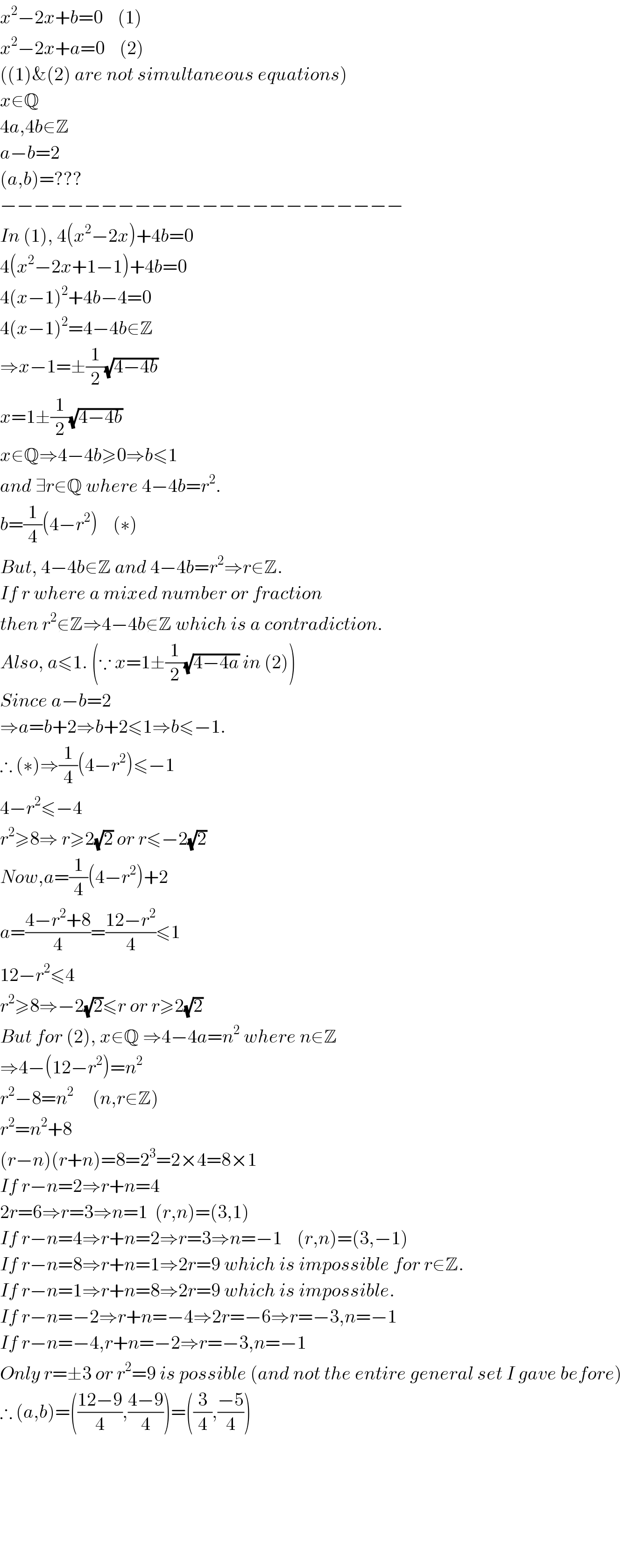
Question Number 5953 by 314159 last updated on 07/Jun/16

Commented by Rasheed Soomro last updated on 07/Jun/16

$$\mathcal{T}{h}\:{a}\:{nk}\mathcal{S}! \\ $$
Commented by Yozzii last updated on 07/Jun/16

$${Thanks}\:{Prakash}.\:{I}\:{was}\:{thinking}\:{to} \\ $$$${point}\:{that}\:{out}\:{but}\:{I}\:{thought}\:{it}\:{would} \\ $$$${have}\:{been}\:{understood}\:{by}\:{the}\:{scenario}. \\ $$
Commented by Yozzii last updated on 07/Jun/16

$${x}^{\mathrm{2}} −\mathrm{2}{x}+{b}=\mathrm{0}\:\:\:\:\left(\mathrm{1}\right) \\ $$$${x}^{\mathrm{2}} −\mathrm{2}{x}+{a}=\mathrm{0}\:\:\:\:\left(\mathrm{2}\right)\:\:\:\: \\ $$$$\left(\left(\mathrm{1}\right)\&\left(\mathrm{2}\right)\:{are}\:{not}\:{simultaneous}\:{equations}\right) \\ $$$${x}\in\mathbb{Q} \\ $$$$\mathrm{4}{a},\mathrm{4}{b}\in\mathbb{Z} \\ $$$${a}−{b}=\mathrm{2} \\ $$$$\left({a},{b}\right)=??? \\ $$$$−−−−−−−−−−−−−−−−−−−−−−−− \\ $$$${In}\:\left(\mathrm{1}\right),\:\mathrm{4}\left({x}^{\mathrm{2}} −\mathrm{2}{x}\right)+\mathrm{4}{b}=\mathrm{0} \\ $$$$\mathrm{4}\left({x}^{\mathrm{2}} −\mathrm{2}{x}+\mathrm{1}−\mathrm{1}\right)+\mathrm{4}{b}=\mathrm{0} \\ $$$$\mathrm{4}\left({x}−\mathrm{1}\right)^{\mathrm{2}} +\mathrm{4}{b}−\mathrm{4}=\mathrm{0} \\ $$$$\mathrm{4}\left({x}−\mathrm{1}\right)^{\mathrm{2}} =\mathrm{4}−\mathrm{4}{b}\in\mathbb{Z} \\ $$$$\Rightarrow{x}−\mathrm{1}=\pm\frac{\mathrm{1}}{\mathrm{2}}\sqrt{\mathrm{4}−\mathrm{4}{b}} \\ $$$${x}=\mathrm{1}\pm\frac{\mathrm{1}}{\mathrm{2}}\sqrt{\mathrm{4}−\mathrm{4}{b}} \\ $$$${x}\in\mathbb{Q}\Rightarrow\mathrm{4}−\mathrm{4}{b}\geqslant\mathrm{0}\Rightarrow{b}\leqslant\mathrm{1} \\ $$$${and}\:\exists{r}\in\mathbb{Q}\:{where}\:\mathrm{4}−\mathrm{4}{b}={r}^{\mathrm{2}} . \\ $$$${b}=\frac{\mathrm{1}}{\mathrm{4}}\left(\mathrm{4}−{r}^{\mathrm{2}} \right)\:\:\:\:\left(\ast\right) \\ $$$${But},\:\mathrm{4}−\mathrm{4}{b}\in\mathbb{Z}\:{and}\:\mathrm{4}−\mathrm{4}{b}={r}^{\mathrm{2}} \Rightarrow{r}\in\mathbb{Z}. \\ $$$${If}\:{r}\:{where}\:{a}\:{mixed}\:{number}\:{or}\:{fraction} \\ $$$${then}\:{r}^{\mathrm{2}} \notin\mathbb{Z}\Rightarrow\mathrm{4}−\mathrm{4}{b}\notin\mathbb{Z}\:{which}\:{is}\:{a}\:{contradiction}. \\ $$$${Also},\:{a}\leqslant\mathrm{1}.\:\left(\because\:{x}=\mathrm{1}\pm\frac{\mathrm{1}}{\mathrm{2}}\sqrt{\mathrm{4}−\mathrm{4}{a}}\:{in}\:\left(\mathrm{2}\right)\right) \\ $$$${Since}\:{a}−{b}=\mathrm{2} \\ $$$$\Rightarrow{a}={b}+\mathrm{2}\Rightarrow{b}+\mathrm{2}\leqslant\mathrm{1}\Rightarrow{b}\leqslant−\mathrm{1}. \\ $$$$\therefore\:\left(\ast\right)\Rightarrow\frac{\mathrm{1}}{\mathrm{4}}\left(\mathrm{4}−{r}^{\mathrm{2}} \right)\leqslant−\mathrm{1} \\ $$$$\mathrm{4}−{r}^{\mathrm{2}} \leqslant−\mathrm{4} \\ $$$${r}^{\mathrm{2}} \geqslant\mathrm{8}\Rightarrow\:{r}\geqslant\mathrm{2}\sqrt{\mathrm{2}}\:{or}\:{r}\leqslant−\mathrm{2}\sqrt{\mathrm{2}} \\ $$$${Now},{a}=\frac{\mathrm{1}}{\mathrm{4}}\left(\mathrm{4}−{r}^{\mathrm{2}} \right)+\mathrm{2} \\ $$$${a}=\frac{\mathrm{4}−{r}^{\mathrm{2}} +\mathrm{8}}{\mathrm{4}}=\frac{\mathrm{12}−{r}^{\mathrm{2}} }{\mathrm{4}}\leqslant\mathrm{1} \\ $$$$\mathrm{12}−{r}^{\mathrm{2}} \leqslant\mathrm{4} \\ $$$${r}^{\mathrm{2}} \geqslant\mathrm{8}\Rightarrow−\mathrm{2}\sqrt{\mathrm{2}}\leqslant{r}\:{or}\:{r}\geqslant\mathrm{2}\sqrt{\mathrm{2}} \\ $$$${But}\:{for}\:\left(\mathrm{2}\right),\:{x}\in\mathbb{Q}\:\Rightarrow\mathrm{4}−\mathrm{4}{a}={n}^{\mathrm{2}} \:{where}\:{n}\in\mathbb{Z} \\ $$$$\Rightarrow\mathrm{4}−\left(\mathrm{12}−{r}^{\mathrm{2}} \right)={n}^{\mathrm{2}} \\ $$$${r}^{\mathrm{2}} −\mathrm{8}={n}^{\mathrm{2}} \:\:\:\:\:\left({n},{r}\in\mathbb{Z}\right) \\ $$$${r}^{\mathrm{2}} ={n}^{\mathrm{2}} +\mathrm{8} \\ $$$$\left({r}−{n}\right)\left({r}+{n}\right)=\mathrm{8}=\mathrm{2}^{\mathrm{3}} =\mathrm{2}×\mathrm{4}=\mathrm{8}×\mathrm{1} \\ $$$${If}\:{r}−{n}=\mathrm{2}\Rightarrow{r}+{n}=\mathrm{4} \\ $$$$\mathrm{2}{r}=\mathrm{6}\Rightarrow{r}=\mathrm{3}\Rightarrow{n}=\mathrm{1}\:\:\left({r},{n}\right)=\left(\mathrm{3},\mathrm{1}\right) \\ $$$${If}\:{r}−{n}=\mathrm{4}\Rightarrow{r}+{n}=\mathrm{2}\Rightarrow{r}=\mathrm{3}\Rightarrow{n}=−\mathrm{1}\:\:\:\:\left({r},{n}\right)=\left(\mathrm{3},−\mathrm{1}\right) \\ $$$${If}\:{r}−{n}=\mathrm{8}\Rightarrow{r}+{n}=\mathrm{1}\Rightarrow\mathrm{2}{r}=\mathrm{9}\:{which}\:{is}\:{impossible}\:{for}\:{r}\in\mathbb{Z}. \\ $$$${If}\:{r}−{n}=\mathrm{1}\Rightarrow{r}+{n}=\mathrm{8}\Rightarrow\mathrm{2}{r}=\mathrm{9}\:{which}\:{is}\:{impossible}. \\ $$$${If}\:{r}−{n}=−\mathrm{2}\Rightarrow{r}+{n}=−\mathrm{4}\Rightarrow\mathrm{2}{r}=−\mathrm{6}\Rightarrow{r}=−\mathrm{3},{n}=−\mathrm{1} \\ $$$${If}\:{r}−{n}=−\mathrm{4},{r}+{n}=−\mathrm{2}\Rightarrow{r}=−\mathrm{3},{n}=−\mathrm{1} \\ $$$${Only}\:{r}=\pm\mathrm{3}\:{or}\:{r}^{\mathrm{2}} =\mathrm{9}\:{is}\:{possible}\:\left({and}\:{not}\:{the}\:{entire}\:{general}\:{set}\:{I}\:{gave}\:{before}\right) \\ $$$$\therefore\:\left({a},{b}\right)=\left(\frac{\mathrm{12}−\mathrm{9}}{\mathrm{4}},\frac{\mathrm{4}−\mathrm{9}}{\mathrm{4}}\right)=\left(\frac{\mathrm{3}}{\mathrm{4}},\frac{−\mathrm{5}}{\mathrm{4}}\right) \\ $$$$ \\ $$$$ \\ $$$$ \\ $$$$ \\ $$$$ \\ $$
Commented by Rasheed Soomro last updated on 07/Jun/16
![x^2 −2x+a=0 (i) x^2 −2x+b=0 (ii) subtracting (ii) from (i) a−b=0 But a−b=2 [given] Isn′t it contradictary?](Q5956.png)
$${x}^{\mathrm{2}} −\mathrm{2}{x}+{a}=\mathrm{0}\:\:\:\:\left({i}\right) \\ $$$${x}^{\mathrm{2}} −\mathrm{2}{x}+{b}=\mathrm{0}\:\:\:\:\:\:\left({ii}\right) \\ $$$${subtracting}\:\left({ii}\right)\:{from}\:\left({i}\right) \\ $$$$\:\:\:\:\:\:\:\:\:\:{a}−{b}=\mathrm{0} \\ $$$${But}\:\:{a}−{b}=\mathrm{2}\:\left[{given}\right] \\ $$$${Isn}'{t}\:{it}\:{contradictary}? \\ $$
Commented by prakash jain last updated on 07/Jun/16

$$\mathrm{Value}\:\mathrm{of}\:{x}\:\mathrm{may}\:\mathrm{be}\:\mathrm{different}\:\mathrm{in}\:\mathrm{two}\:\mathrm{equations}. \\ $$$$\mathrm{These}\:\mathrm{are}\:\mathrm{not}\:\mathrm{simultaneous}\:\mathrm{equation}. \\ $$
